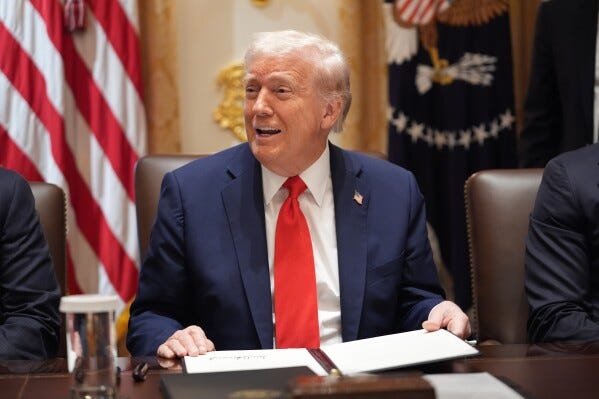If you couldn’t catch Hot Take Happy Hour with me and Danielle Pletka, here is the recording. Dany will have her own piece on the deal and I have some of her previous work in the show notes below. Here is my take:
After watching Trump’s first-term Middle East policy veer between genius and chaos, often within the same week, I approached his recent Gaza diplomacy with the skepticism of someone who’s covered enough peace processes to know how spectacularly they can fail. But credit where it’s due: Trump did what Joe Biden couldn’t and countless diplomats before him tried and failed to do.
Now comes the part where I rain on the parade a bit. Because calling this “everlasting peace” - as Trump did on Truth Social Thursday - is like declaring mission accomplished on an aircraft carrier before the war actually ends. The hostages aren’t home yet. Hamas still controls Gaza. And Netanyahu’s far-right coalition is already talking about resuming the fight once Israel’s captives are freed.
The real test of Trump’s diplomacy doesn’t come this weekend during the signing ceremony photo op he’s planning in Egypt. It comes in the weeks and months after, when he’ll need to do something that’s never been his strong suit: stay engaged in the unglamorous work of implementation.
The art of the Middle East deal
Here’s what Trump got right - and it’s worth acknowledging because it worked.
First, he let himself be flattered into engagement. At the UN General Assembly last month, Trump convened Arab and Muslim leaders in what he later called his “most important meeting” at the UN. There, with the UAE organizing and leaders from Qatar, Turkey, Saudi Arabia and others present, Trump unveiled his 20-point plan. Qatar’s emir told him: “We count on you and your leadership to end this war.” The prospect of chairing a “Board of Peace” overseeing Gaza’s reconstruction appealed to Trump’s construction-mogul instincts. And with his Ukraine peace efforts stalling, that elusive Nobel suddenly seemed within reach.
But flattery alone doesn’t move Benjamin Netanyahu. What changed the dynamic was Qatar - and Trump’s willingness to actually confront an ally.
On September 9, Israel unilaterally bombed Doha, targeting Hamas negotiators without consulting Washington. The strike failed to kill its targets but succeeded in enraging Qatar, host to the largest US military base in the Middle East and making Gulf states fear they could be next. Trump was furious. He forced Netanyahu to call Qatar’s prime minister during their White House meeting and read a formal apology. Then Trump issued an extraordinary executive order declaring any future attack on Qatar would be treated as an attack on the United States.
Read that again. Trump essentially put an American security guarantee on an Arab state to protect it from Israel. That’s not the move of someone going through the motions.
The message to Netanyahu was unmistakable: there were limits to American support. Trump told Fox News he had warned the Israeli prime minister that “Israel cannot fight the world,” adding pointedly, “And he understands that very well.”
That leverage proved crucial. Trump also got Netanyahu to accept terms ruling out West Bank annexation and Palestinian displacement - positions the prime minister had previously rejected. When combined with the devastating American and Israeli strikes on Iran’s nuclear facilities over the summer, which set Tehran’s program back years and weakened its ability to support Hamas, the pieces fell into place.
The Arab states, seeing genuine American commitment and a pathway toward Palestinian statehood, put unprecedented pressure on Hamas. With Gazans exhausted by two years of war and blaming Hamas for their misery, and with Trump making clear Israel would resume operations with his “full backing” if Hamas rejected the deal, the militant group had few cards left to play.
Here’s what Trump’s proclamation glosses over: Almost nothing has actually been resolved.
Phase one calls for Israel to cease fire, Hamas to release all hostages within 72 hours, Israel to partially withdraw troops and release Palestinian prisoners, and humanitarian aid to flood Gaza. If that happens - and it’s still an if - it will be momentous. Hostage families reunited. Starving Gazans fed. The killing stopped, at least temporarily.
Everything else has been kicked down the road. Who governs Gaza after Hamas? How does Hamas disarm, and who monitors it? What role does the Palestinian Authority play? When do Israeli troops fully withdraw? What does a “credible pathway” to Palestinian statehood actually mean?
On these questions, the parties have fundamentally different understandings of what they agreed to. Hamas believes Israeli withdrawal is guaranteed once hostages are released. Israel says withdrawal depends on “milestones linked to demilitarization” - with no timeline. Netanyahu told hostage families Sunday that “as long as the last hostage has not returned, we will not move forward on any other point,” and that neither Hamas nor the Palestinian Authority would govern Gaza. “Israel will be responsible for and involved in the disarmament of Gaza,” he said.
Israeli Finance Minister Bezalel Smotrich was even blunter, saying Israel has a responsibility to “continue to strive with all its might for the true eradication of Hamas” after the captives are released. Translation, at least in Israel’s eyes: there is no phase two.
Hamas, meanwhile, won’t disarm unless there’s a permanent end to the war and complete Israeli withdrawal - conditions not in Trump’s plan. Senior Hamas leaders have said they received guarantees from Trump that Israel won’t resume bombing after hostages are freed, but Israeli officials have said no such thing publicly.
We’ve been here before. Earlier this year, Israel and Hamas agreed to a 60-day ceasefire with hostage releases. It collapsed when Israel resumed operations. The risk now is even greater because once Hamas releases all living hostages, it loses its primary leverage. Netanyahu, facing pressure from his far-right coalition to continue the war, may find a pretext to restart operations.
Why Trump can’t declare victory and go home
The only thing preventing that outcome is sustained American pressure. And here’s where my skepticism kicks in.
Trump projected confidence Thursday, saying “we ended the war in Gaza” and created “a lasting peace, hopefully.” But when asked whether there are guarantees Hamas would disarm and Israel wouldn’t return to bombing, Trump revealed the fragility: “First thing we’re doing is getting our hostages back. After that, we’ll see.”
That’s not reassuring. Trump needs to engaged. Without that, his deal is as shaky as the ones before it.
Trump plans to travel to Egypt for a signing ceremony once hostages are released, probably Monday or Tuesday. It will be cinematic - the kind of moment that makes history books and Nobel Prize citations. But a signing ceremony doesn’t create peace. It creates a photo op.
The question is whether Trump will stay engaged after the immediate crisis passes. That means continued pressure on Netanyahu to withdraw troops, allow reconstruction, and engage seriously with questions about Gaza’s future governance. It means working with Arab states who are demanding a UN Security Council mandate for any international stabilization force and insisting Gaza and the West Bank be treated as one political entity leading toward Palestinian statehood. It means ensuring humanitarian aid continues flowing and that Gazans - tens of thousands of whom are starving, homeless, and living in ruins - can begin rebuilding shattered lives.
These are unglamorous, grinding diplomatic tasks without clear victories or viral moments. They require patience, persistence, and sustained high-level engagement - qualities not typically associated with Trump’s approach to foreign policy.
The opportunity Trump created
But here’s the thing - and I say this as someone who spends more time criticizing Trump than praising him- if he can pull this off, it won’t just be historic. It will fundamentally reshape the region in ways that could last a generation.
Israel’s military position is stronger than it’s been in decades. Iran is weakened. Hezbollah is gutted. Hamas is decimated. Syria’s Assad regime has fallen. The Abraham Accords demonstrated unprecedented Arab acceptance of Israel. Trump inherited favorable conditions; his contribution was forcing both sides to capitalize on them rather than letting the moment slip away.
What makes Trump uniquely positioned for this moment is his immunity to conventional political constraints. He can demand concessions from Israel without being labeled anti-Semitic. He can negotiate with Arab states his Republican base once viewed with suspicion. He can push allies in ways traditional diplomacy can’t because his willingness to walk away - and be genuinely unpredictable about it - creates leverage others simply don’t have.
Trump also understands what Biden never quite grasped: that diplomacy means nothing if it’s not backed by the credible threat of force. Biden let domestic politics influence his handling of Israel in ultimately counterproductive ways, while Trump knew instinctively that Israel needed to win militarily before diplomacy could succeed. As former Israeli Air and Missile Defense commander Ran Kochav put it: “Trump forced a plan on both Netanyahu and Hamas that neither of them really wanted.”
That’s real power. The question is whether Trump will use it to see this through.
Countless Israelis and Gazans spent Thursday celebrating massive progress toward ending their two-year nightmare. They deserve to celebrate. Hostage families deserve hope. Starving Gazans deserve relief.
But until the question of who governs Gaza is resolved, the war isn’t over and peace will remain elusive.
An A for effort
Now, let’s talk about the elephant in the room: Trump desperately wants that Nobel Peace Prize. And I mean desperately.
He regularly claims to have ended “six or seven wars” since returning to office, a running tally that’s become something of a parlor game among foreign diplomats.
And here’s the thing: I’ll give Trump an A for effort. His willingness to play hardball with allies and adversaries alike has produced results traditional diplomacy couldn’t. He got both sides talking when everyone else had given up. He applied pressure Biden couldn’t or wouldn’t. He leveraged relationships, used military strikes strategically, and bound himself personally to the outcome. That’s real diplomacy, however unconventional.
Beyond Gaza, Trump has thrown himself into conflicts around the world – helping to mediate ceasefires between India and Pakistan, brokering talks between Armenia and Azerbaijan, pushing Congo and Rwanda toward peace negotiations, and most notably, attempting to end the war in Ukraine with that high-stakes summit with Putin in Alaska. Some of these efforts have produced tangible results, others remain works in progress, and a few (looking at you, Egypt-Ethiopia water dispute) were barely conflicts to begin with. But the sheer ambition of trying to solve multiple intractable conflicts simultaneously - however transparently motivated by Nobel dreams - represents a level of presidential engagement in global peace efforts we haven’t seen in years. That’s not nothing.
But the Nobel isn’t a participation trophy for good intentions or dramatic gestures. It’s recognition of sustained achievement that makes the world more peaceful, more stable, more united. You get it for lasting peace. And you definitely don’t get it while simultaneously threatening to seize Greenland from Denmark bullying allies on trade, withdrawing from multinational treaties and generally dividing the world into winners and losers of Trump’s transactional diplomacy. You can’t separate one diplomatic achievement from a broader foreign policy that treats alliances like protection rackets and international cooperation like a sucker’s game.
Should he get the Nobel someday? If this deal actually ends the war, if Hamas disarms, if Gaza rebuilds, if Palestinian statehood becomes reality? If this Gaza deal holds - and it’s a big if - Trump will have accomplished something significant worthy of the Nobel
Right now, Trump has brokered a ceasefire. That matters. That’s worth celebrating. But “everlasting peace” requires staying engaged long after the cameras leave, long after the Nobel announcement passes, long after the thrill of the deal fades.
Show Notes
Elise’s piece: The Lost Plot of October 7 (Substack, Oct. 7, 2025)
Dany’s piece: WTH: Two years after October 7, there is no path to peace (Substack, Oct. 6, 2025)
Can Palestinian Politics Be Revived? (Carnegie Endowment for International Peace, Sept. 24, 2025)
RFK on autism (Oct 9, 2025 - trust me, you have to watch it to believe it)
Thank you David Galinsky, Candace Head-Dylla, Courtneye, lindaloo, Sloane, and many others for tuning into my live video with Danielle Pletka! Join me for my next live video in the app.















